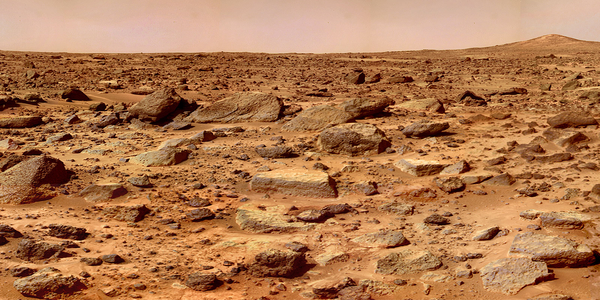Scientists Discover Evidence of Mars Lake

Mars is very much a place that has captivated my and many other people's imaginations. The red surface, the prospect of alien life, and the awesome discoveries we seem to keep turning up just make the tale of the Red Planet even more exciting. Scientists have recently uncovered more findings that may help us understand more about the planet's history and how it has changed so vastly over time.
According to Red Orbit a group of scientists, using data provided by NASA's Spirit Rover, have found evidence of ancient water in a Mars crater. The Gusev crater is 100 miles wide and due to its massive size and depth, scientists have wondered for a decade if it may have once been a body of water. A Mars lake.
Steve Ruff and his team of scientists at Arizona State University believe that the Gusev crater body of water may have dried up and re-appeared several times in Mars's history. They issued a report in the Journal of Geology explaining their findings. When you view the crater from above, you can see that the crater is similar to lakes on earth. The southern portion of the crater winds much like a river or creek. The rocks around the crater, however, don't show evidence of being a Mars lake bed.
The nearby Columbia Hills on Mars which stretch 300 feet into the sky has been shown to have evidence of water. The Spirit rover could determine that the rocks look like they'd been changed by the flow of water over time, but there was still no evidence of a Mars lake bed. There was some evidence of hydrothermal activity, which appear as geysers on earth, but that explanation for the changing rocks didn't fly with scientists. With more studying, Ruff and his team determined that the crater and Columbia Hills were flooded, which allowed the rocks to change over time.
Mars is definitely one of the places out in the universe that humans are crazy about. The Curiosity rover recently sent back photos that showed what conspiracy theorists were calling an alien bonfire (it was a lens glare, maybe). It's been proven, at least to most people, that there aren't any martians on the Red Planet. Mars is the kind of place humans are just itching to explore with their own eyes and hands. No human has come anywhere close to walking on it's surface; yet, we definitely don't have a hard time imagining what it could be like.
In 2020, a new rover will be sent to Mars, which will collect actual soil and rock samples and search for evidence of past life on the Red Planet. Scientists are hoping that this rover will be the first one that will be able to travel back to Earth. This would mean hands on sample analysis that could bring us closer to figuring out more about water on Mars. This would be great news for the upcoming Mars One mission that is starting a human colony on Mars in 2023. Even though the prospect of living anywhere but our little blue planet scares me, the more scientists learn about Mars, the more like living there seems like a possibility.
Your Daily Blend of Entertainment News
